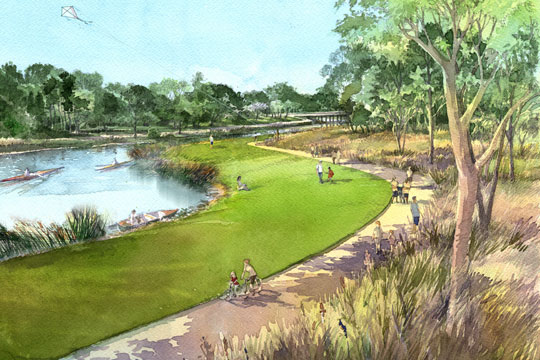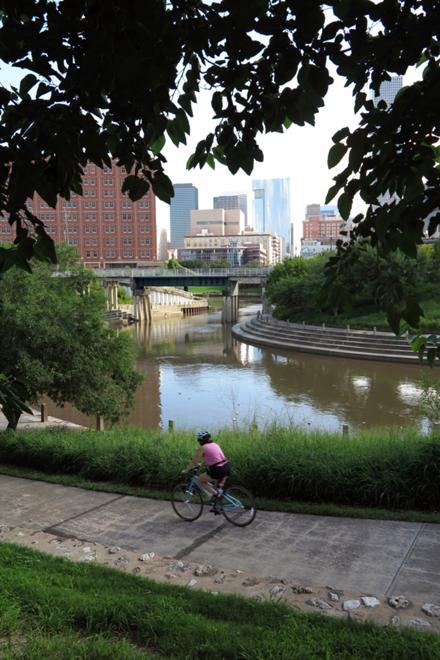
Houston's Bayou Greenways plan is perhaps the largest active transportation project in the country right now -- if residents can actually use it for transportation when it's completed.
Jen Powis of the Houston Parks Board has described the greenway project as a cross between the Atlanta Beltline and the Portland Bike Master Plan, which "re-envisions transportation" in the city. The project is undoubtedly ambitious, but it remains to be seen whether the city will create safe street-level walking and biking connections to the greenway network.
Construction of the Bayou Greenways is already underway. Once complete, it will consist of a comprehensive network of greenways and walking and biking trails along the city's many natural bayous.

The plan comes from a blueprint more than 100 years old. It was part of early city planner Arthur Comey's vision for the Houston park system back in 1912. And in many ways, it's brilliant.
Greater Houston has 10 major natural bayous, which flow out toward the Gulf of Mexico, spread fairly uniformly across the region. These marshy areas aren't suitable for development, but they can be used for active transportation and recreation. Already there are some 70 miles of disconnected biking and walking paths along these waterways.
The $480 million project will create a network of 300 miles of paths and some 4,000 acres of parkland along these waterways over seven years. If it were completed today, it would be the country's largest urban trail system.
Linking together the bayous and sprucing them up is expected to pay big dividends. For one, it will greatly expand recreational amenities in the region; six out of 10 Houstonians will live within a mile and a half of a trail or greenway. The city has estimated the combined economic return at $70 million per year. Of that, $10 million is expected to accrue annually from increased property values near the parks and improved business attraction and retention. Another $10 million is expected to come from enhanced water quality and reduced flooding. Finally, the expected increase in exercise and physical fitness is valued at $50 million annually.
Here's another thing the project has going for it: People really like it as a use of infrastructure funds. In 2012 voters overwhelmingly passed a $166 million bond issue, $100 million of which will go to support construction of the Bayou Greenways. The measure won with 68 percent of the vote -- the highest ever for a tax issue in the city's history.
The project broke ground last October. Project leaders aim to finish it by 2020, and they are well on their way to assembling the remaining funds to make it happen. They hope to match the public's $100 million investment dollar-for-dollar with private funds. The project recently received $50 million from the Kinder Foundation.
Jay Crossley of the local smart growth advocacy group Houston Tomorrow says the Greenways plan is really exciting, but he wants to be sure Houston's local streets offer safe biking and walking connections to the greenway network. Otherwise the improvements may be much less valuable. The city's new complete streets policy, enacted last year by Mayor Annise Parker, will be especially important as this project moves forward, he said.
"What is the point of a terrific off road hike/bike network if it isn’t safe for kids in nearby neighborhoods to walk or bike to it?" he said. "So, for it to really reach its potential, we need basic connections of the trail system to streets and neighborhoods and then we need complete streets across the whole city, so kids in every neighborhood feel comfortable and safe to actually get to the Bayou Greenways."
In a follow-up post, we'll look at an idea percolating in Houston to use utility line rights-of-way to connect the city's active transportation network. Stay tuned.





